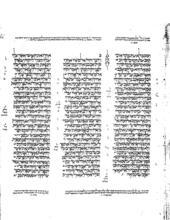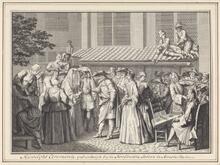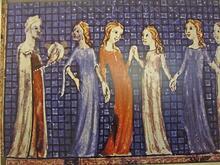Maimonides
Rabbi Moses ben Maimon, referred to as Maimonides or by the acronym Rambam, was born in Cordova, Spain, in 1138. His writings made him one of the most prolific and influential Jewish scholars of the Middle Ages. Maimonides discussed women and their status in Jewish life, practice, and society at various points in his extensive legal and philosophical commentaries. Some of his restrictive and negative attitudes seem deeply influenced by the surrounding Muslim culture and women’s socioeconomic status within its society. However, his strong philosophical rationalist belief system enabled him also to see women as beings with spiritual potential and at times motivated him to defend and improve their legal rights. Maimonides died in Fostat, Egypt, in 1204 at the age of 69.
Rabbi Moses ben Maimon (Moses ben Maimon (Rambam), b. Spain, 1138Rambam) was born in Cordova, Spain in 1138 and died in Fostat (old Cairo), Egypt in 1204. During his lifetime he traveled with his family from Spain to Fez, Morocco, where he studied medicine and practiced as a physician, and from there to The Land of IsraelErez Israel, finally settling in Egypt, where he became the leader of the community. Maimonides’s vast legal and philosophical writings touch on many topics related to women and their status. Some of his restrictive and negative attitudes seem deeply influenced by the surrounding Muslim culture and women’s socio-economic status within that society. However, his strong philosophical rationalist belief system enabled him also to see women as beings with spiritual potential and at times motivated him to defend and improve their legal rights.
General Philosophy
Maimonides accepts the Aristotelian view that identifies the male with form and the female with matter, which receives meaning only in relationship to form (Guide of the Perplexed 1:17). This relationship of matter to form causes women, who desire always to be in an intimate relationship with men, to be easily seduced into adultery (GP 3:8). Maimonides thus explains the verse “and he shall rule over you” (Genesis 3:16) not as a description but rather as a command desired by God after the sin of the Garden of Eden (GP 3:8). Maimonides also believes women to be biologically inferior to men (GP 3:48); however, his views on embryology break with traditional philosophical thought that sees the woman as a passive vessel, and instead he sides with the physicians, who believe that women have semen and are active participants in creation (GP 2:17).
Husband and Wife Relationship
Maimonides’s recipe for a “pleasant and honorable” marriage entails clear instructions for a submissive wife. Fear of her husband should rule her and she should honor him beyond any limit. The wife should intuit all his desires, remove all his hates, follow all his commands and should view her husband as a prince or king (Mishneh Torah she-bi-khetav: Lit. "the written Torah." The Bible; the Pentateuch; Tanakh (the Pentateuch, Prophets and Hagiographia)Torah Ishut 15:20). In return, the husband should not instill undue fear in her, but should act gently towards her, without anger (MT Ishut 15:19). If the husband wounds his wife, he must pay compensation in full for her injury, humiliation, pain, and medical expenses. The money belongs solely to her and Maimonides states, in opposition to earlier sources ((Aramaic) A work containing a collection of tanna'itic beraitot, organized into a series of tractates each of which parallels a tractate of the Mishnah.Tosefta Bava Kamma 9:14), that the husband cannot benefit from it in any way. If the husband injures her during consensual intercourse, he is also liable for damages (MT Hovel u-Mazik 4:16–17). However, if the wife refuses to do any of the legally obligated household work for her husband, Maimonides states that the courts may force her to submit by hitting her with a rod. If the husband and wife present different claims in regard to her behavior, the court must appoint someone to stay with them and witness the actual dynamic (MT Ishut 21:10). Maimonides’s extreme stance in this case seems to stem from his intense belief that idleness leads to immorality. (MT Ishut 21:2–3).
Maimonides permits many types of sexual interaction between husband and wife, as long as the act is consensual and does not occur in excess. The husband can have intercourse whenever he wishes when his wife is permissible to him and kiss any part of the woman’s body as he desires. He may have vaginal or anal intercourse with his wife. Maimonides instructs that one should not have intercourse while thinking of somebody else, while drunk, while in the midst of a fight, when one is asleep, when one hates the other, or after he has decided in his heart to divorce her. Maimonides explicitly states that the husband should not force her to have intercourse against her will or if she is afraid of him (MT Forbidden Intercourse 21:9, 12). In MT De’ot 5:4, he states, “And he should not rape her if she does not want it, rather it should be from mutual desire and happiness.”
Maimonides expects women to behave with extreme modesty. The husband must provide his wife with a veil. (If she goes out without one she can be divorced and lose the money of her Marriage document (in Aramaic) dictating husband's personal and financial obligations to his wife.ketubbah [MT Ishut 24:12]). Maimonides states that since the woman is not imprisoned, she is permitted to go out to her father’s house or to a wedding; however, it would be unseemly if she were to leave her home excessively and therefore her husband should prevent his wife from doing so except for once or twice a month. Since “all the honor of the king’s daughter is within” (Psalms 45:14), she should sit in the corner of her house with no freedom of movement (MT Ishut 13:11; see Halakhic decisions written by rabbinic authories in response to questions posed to them.responsa1:34 for the restriction on teaching outside the home).
Issues of Marriage
As a rationalist, Maimonides at times takes into account the woman’s feeling towards marriage (and divorce, see below). He was against a father marrying off his minor daughter since he believed it would be better to allow her to reach adulthood and then state whether she consents to the match (MT Ishut 3:19, Halakhic decisions written by rabbinic authories in response to questions posed to them.responsa196, 364). In Egypt, he made a “decree for daughters of Israel” in which a stipulation was inserted into the Marriage document (in Aramaic) dictating husband's personal and financial obligations to his wife.ketubbah stating that the husband cannot marry another woman or hire a hated servant without first receiving the wife’s permission or granting her a get (Responsa 1:88). He instructed the court not to perform a marriage between a woman and someone outside the community until the man brought proof or swore that he was not already married or had divorced his first wife. Any man who left the community to travel, even with his wife’s permission, was required to write her a get with a set time limit in case he did not return (Responsa 2:347).
In Egypt, as in the statements made in the Lit. "teaching," "study," or "learning." A compilation of the commentary and discussions of the amora'im on the Mishnah. When not specified, "Talmud" refers to the Babylonian Talmud.Talmud, a katlanit (killer-wife, a woman who was considered to be a murderous wife since her two previous husbands had died during marriage) was prevented from marrying a third time. Maimonides strongly spoke out against this irrational practice and stated that no prohibition existed whatsoever. He ridicules the fools who compare this situation to the life-threatening situation of circumcision and states that all fear of this woman was based on imaginary superstition and witchcraft. He was especially concerned about what such action would cause a young woman to lose and that it would force her to seek out the ways of immorality. He instructs the courts to inform her that it is permissible to find someone to marry and that after the kiddushin the courts, unlike with most marriages, should write the ketubbah and recite the seven nuptial blessings (Responsa 2:218). It seems that Maimonides mandated court involvement to try to change well-established societal views.
Despite his own restrictions against polygamy, Maimonides believed that the biblical commandment of Marriage between a widow whose husband died childless (the yevamah) and the brother of the deceased (the yavam or levir).Levirate marriage (yibbum) superseded other issues and if the man was already married and his wife protested she could receive a divorce before he performed the ritual. Maimonides views levirate marriage as a requirement that takes precedent over the option of halizah (Responsa 2:218, 2:373). A woman may legally refuse levirate marriage only for reasons of physical defects in the man (MT Marriage between a widow whose husband died childless (the yevamah) and the brother of the deceased (the yavam or levir).yibbum and Halizah 2:9,14).
Divorce
Maimonides explains that divorce is permitted in order to prevent immorality and adultery (GP part 3, chapter 49). He does not agree with the opinion of R. Akiva that a man may divorce his wife just because he finds someone prettier, for he explains that the wife has not transgressed in any way (Commentary to Codification of basic Jewish Oral Law; edited and arranged by R. Judah ha-Nasi c. 200 C.E.Mishnah Writ of (religious) divorceGittin 9:10). After ten years of being childless due to her husband’s infertility, a woman may claim divorce and it is granted (MT Ishut 15:10, 15), while a man is forced by the court with beating of a rod to divorce his wife after ten years of infertility, even against his wishes (MT Ishut 15:7). If she is the one who is barren or if the cause is unknown, then the husband divorces her and she loses her essential Marriage document (in Aramaic) dictating husband's personal and financial obligations to his wife.ketubbah but receives the additional money (tosefet) (MT Ishut 15:8–9).
In a very controversial ruling that aroused much opposition, Maimonides states that if the woman claims she cannot live with her husband and have intimate relations with him because he is disgusting or loathsome to her, her claim is accepted without question and a divorce is immediately granted, although she loses the money of her ketubbah (MT Ishut 14:8–9, 14). Maimonides goes so far as to say that the get is still valid even if the court must force him with lashes until he says he is prepared to give the get. It is still valid if non-Jews force him to listen to the court (MT Gerushin 2:20). Maimonides, seemingly motivated by his rationalist thought, could not imagine forcing a woman to remain in a violent or personally undesirable relationship; thus he creates a legal way out of the marriage without requiring her to explain her claim but rather by just stating her wishes.
Lesbianism
Maimonides forbids intimate relationships between women and compares them to the behavior of the Egyptians, which the Torah she-bi-khetav: Lit. "the written Torah." The Bible; the Pentateuch; Tanakh (the Pentateuch, Prophets and Hagiographia)Torah warns against imitating, although he states that one cannot receive lashes since the Torah did not explicitly state the prohibition. He cannot conceive of a monogamous female relationship and so explains that these women are not forbidden to their husbands or from marrying priests. Maimonides instructs the husband to be strict with his wife and prevent her from socializing with women who are known lesbians (MT Forbidden Intercourse 21:8).
Menstruation and the Karaites
Living in Egypt amongst a large Karaite population, Maimonides at times fought against their practices. He specifically states that a menstruant (Menstruation; the menstruant woman; ritual status of the menstruant woman.niddah) may hold a Torah she-bi-khetav: Lit. "the written Torah." The Bible; the Pentateuch; Tanakh (the Pentateuch, Prophets and Hagiographia)Torah scroll (MT Manuscript scroll of the Pentateuch used in public worship.Sefer Torah 10:8). He intensively battled against an organized revolt by women who refused to immerse in the ritual bath (Ritual bathmikveh) but rather, like the Karaites, showered instead. The revolt, which lasted a number of years, was very well coordinated and led by the women of the community, who would not heed any authority. Finally Maimonides decreed that any woman who did not use the mikveh would forfeit the money of her Marriage document (in Aramaic) dictating husband's personal and financial obligations to his wife.ketubbah. A widow or divorcée was required to swear that she kept the seven clean days and immersed in the mikveh or face monetary punishment. Maimonides instructed that the decree be read aloud in synagogue and that it would be binding on future courts (Halakhic decisions written by rabbinic authories in response to questions posed to them.responsa 2:242).
Women’s Intellect and Torah Study
At first glance Maimonides seems not to regard women’s intellectual capabilities highly and appears to place women in the same category as children and fools. Indeed, Maimonides is the only legal authority to codify the law stated in the Sifre that women may not be appointed to any type of public leadership position in the Jewish community (MT Melakhim 1:5). Since women do not know that an additional prohibition exists against eating before The Day of Atonement, which falls on the 10th day of the Hebrew month of Tishrei and is devoted to prayer and fasting.Yom Kippur, Maimonides explains one should let them be in their lack of knowledge, since men cannot be expected to be the policemen of their homes and warn them (MT Shevitat Asor 1:7). Since she is in the house, it is the woman’s obligation to light SabbathShabbat candles even though the man must remind and check her (MT Shabbat 5:3). Contrary to other opinions, Maimonides finds women trustworthy to check for leaven (hamez) (MT Hamez u-Mazzah 2:17). He explains that any man who believes in the truth of wizardry is a fool, lacking in understanding, and is in the same class as women and children, whose intellects are incomplete (MT Idolatry 11:16). Like the rabbinic text, Maimonides states that women are exempt from the obligation to study Torah she-bi-khetav: Lit. "the written Torah." The Bible; the Pentateuch; Tanakh (the Pentateuch, Prophets and Hagiographia)Torah (MT Torah Study 1:1). However, he adds that if a woman does study she receives reward, although not on a par with that of a man. Using the language of advice, he continues by stating that the rabbis prohibited teaching one’s daughter Torah “because most women’s minds are not directed towards study, rather they misinterpret, rendering the text irrational due to their poor minds” (MT Torah Study 1:13).
However, in a number of other sources Maimonides seems to recognize that women have intellectual potential and capabilities similar to those of their male counterparts. Maimonides explains that if one starts to study Torah not for its own sake, this behavior will lead to study due to love of God. Therefore, he recommends that when instructing children, women or amei ha-arez one should first teach them to serve God out of fear or for reward, revealing the truth only little by little until their knowledge increases and they attain a large measure of wisdom. Only then will they be able to grasp and comprehend that one must serve God out of love (MT Repentance 10:5). In his list of commandments Maimonides states that women are obligated to know God and his unity and to love, fear, pray and cleave to him (Sefer ha- A biblical or rabbinic commandment; also, a good deed.Mitzvot, positive mitzvot 1–6 and end of whole section). These obligations are fulfilled by entering into Pardes (a mnemonic acronym for peshat, remez, derash, sod, the four methods of Bible interpretation [literal, allegorical, homiletical and mystical]), which according to Maimonides is part of Lit. "teaching," "study," or "learning." A compilation of the commentary and discussions of the amora'im on the Mishnah. When not specified, "Talmud" refers to the Babylonian Talmud.Talmud (MT Torah Study 1:11-12). Maimonides explains that one cannot use the four methods of Pardes to learn until one’s stomach is full of “bread and meat” (i.e. the Talmud’s discussions of what is prohibited and permissible). Maimonides explains that this knowledge is attainable by all, young and old, men and women; those gifted with great intellectual capacity as well as those whose intelligence is limited (MT Principles of Torah 4:13). From these texts it seems that Maimonides thinks women have an obligation to study Torah, which stems from their relationship with God, and that it is a commandment which they have the potential and capabilities to fulfill. This more egalitarian stance vis-à-vis women’s intellectual potential can also be seen in Maimonides’s philosophical writings. At the end of a long note to GP 3:51, Maimonides discusses the strengthened intellect of old age, as one approaches understanding of God with the onset of death. He quotes the A type of non-halakhic literary activitiy of the Rabbis for interpreting non-legal material according to special principles of interpretation (hermeneutical rules).Midrash that Moses, Aaron and Miriam all “died by the mouth of God.” This Godly kiss marks spiritual intimacy, the experience of Divine passionate love by the intellect of the prophet. In Maimonides’s view prophecy is not something supernatural but rather the direct outcome of striving towards moral and intellectual perfection. If Maimonides presents Miriam as one of the paradigm examples of an individual who has attained this highest relationship with the Divine, he must see this achievement as also possible for other females (see also Eight Chapters 4, GP 2:32). Although, due to the realities of their social world, Maimonides views women as being intellectually immature, he recognizes in women an inherent potential for greater intellectual capabilities that could be realized in the future.
RITUAL PERFORMANCE
Overall, in the area of ritual A biblical or rabbinic commandment; also, a good deed.mitzvah performance, Maimonides presents the law as it was stated by the earlier texts of the Lit. "teaching," "study," or "learning." A compilation of the commentary and discussions of the amora'im on the Mishnah. When not specified, "Talmud" refers to the Babylonian Talmud.Talmud. In all prohibitions women and men are equally obligated. He states that women are exempt from A biblical or rabbinic commandment; also, a good deed.mitzvah aseh she-ha-zeman gerama, which he explains as commandments whose obligations are from time to time and are not constant. He goes on to clarify that there are a number of exceptions to the rule, such as Lit. "sanctification." Prayer recited over a cup of wine at the onset of the Sabbath or Festival.kiddush, mazzah, the A seven-day festival to commemorate the Exodus from Egypt (eight days outside Israel) beginning on the 15th day of the Hebrew month of Nissan. Also called the "Festival of Mazzot"; the "Festival of Spring"; Pesah.Passover sacrifice, Hakhel (assembly) and rejoicing on the festivals (MT Idolatry 12:3). He explains that women may perform commandments from which they are exempt, although without reciting the blessing (MT Zizit 3:9) Despite later misunderstandings, Maimonides states clearly that women are obligated in both biblical and rabbinic prayer forms (MT Prayer 1:1–2, 6:10, commentary Codification of basic Jewish Oral Law; edited and arranged by R. Judah ha-Nasi c. 200 C.E.Mishnah Kiddushin 1:7). He states that women are obligated to say grace after meals and are therefore also obligated to make a Zimmun (the joint invitation to recite grace whenever three or more people have eaten bread together). However, since Maimonides is unsure if women’s obligation in grace is biblical, he rules that women can only invite other women to say grace but not men. (MT Blessings 5:1, 6–7). Seemingly, Maimonides thinks women can recite the seven nuptial blessings (MT Blessings 2:9, Ishut 10:5). He states that women are equally obligated in the reading of Lit. "scroll." Designation of the five scrolls of the Bible (Ruth, Song of Songs, Lamentations, Ecclesiastes, Esther). The Scroll of Esther is read on Purim from a parchment scroll.megillah on Purim and therefore can read for men (MT Megillah 1:1–2). However, women cannot read from the Torah she-bi-khetav: Lit. "the written Torah." The Bible; the Pentateuch; Tanakh (the Pentateuch, Prophets and Hagiographia)Torah in public because they would offend the honor of the community (kevod ha-zibbur). (MT Prayer 12:17). Maimonides believes all of Israel, including women, are obligated in Kiddush ha-Shem (martyrdom) (MT Yesodei ha-Torah 5:1, 5; compare language to MT Prayer 8:4–6 in discussion of The quorum, traditionally of ten adult males over the age of thirteen, required for public synagogue service and several other religious ceremonies.minyan). Unlike many other rabbinic authorities, Maimonides does not let his views about women and modesty, or women’s place within society, interfere with or influence his legal decisions with regard to women’s obligation in ritual performance; the sole factor in codifying law on these matters seems to be the statements of earlier rabbinic texts.
Grossman, Avraham. Pious and Rebellious: Jewish Women in Medieval Europe. Waltham, Massachusetts: 2004.
Harvey, Warren Ze’ev. “The Obligation of Talmud on Woman According to Maimonides.” Tradition 19 (1981): 122–130.
Melamed, Avraham. “Maimonides on Women: Formless Matter or Potential Prophet?” In Perspectives on Jewish Thought and Mysticism, edited by A. Ibry, 99–134. Amsterdam: 1998.






